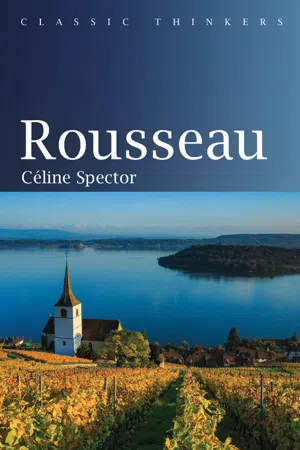Rousseau
About this book
Jean-Jacques Rousseau is one of the most controversial philosophers of the eighteenth century, and his groundbreaking work still provokes heated debate in contemporary political theory.
In this book, Céline Spector, one of the world's foremost experts on Rousseau's thought, provides an accessible introduction to his moral, social and political theory. She explores the themes and central concepts of his thought, ranging from the state of nature, the social contract and the general will to natural and political freedom, religion and education. She combines a skilful exposition of Rousseau as a 'man of paradoxes' with a discussion of his often-overlooked ideas on knowledge, political economy and international relations.
The book traces both the overall unity and the significant changes in Rousseau's philosophy, accounting for its complexity and for the importance of its legacy. It will be essential reading for scholars, students and general readers interested in the Enlightenment and more broadly in the history of modern political thought and philosophy.
Tools to learn more effectively

Saving Books

Keyword Search

Annotating Text

Listen to it instead
Information
1
A Modern Critique of Modernity
The Pathologies of Commercial Society
While Government and Laws provide for the safety and well-being of assembled men, the Sciences, Letters, and Arts, which less despotic and perhaps more powerful, spread garlands of flowers over the iron chains with which men are burdened, stifle in them the sentiment of that original liberty for which they seemed to have been born, make them love their slavery, and turn them into what is called civilised peoples.3
Table of contents
- Cover
- Table of Contents
- Acknowledgements
- Abbreviations
- Introduction
- 1: A Modern Critique of Modernity
- 2: Popular Sovereignty and the General Will
- 3: Political Legitimacy and Applied Politics
- 4: Morality and Education
- 5: Metaphysics and Religion
- 6: Economic Philosophy
- 7: War and Peace
- 8: After Rousseau
- Conclusion
- Bibliography and Further Reading
- Index
- End User License Agreement
Frequently asked questions
- Essential is ideal for learners and professionals who enjoy exploring a wide range of subjects. Access the Essential Library with 800,000+ trusted titles and best-sellers across business, personal growth, and the humanities. Includes unlimited reading time and Standard Read Aloud voice.
- Complete: Perfect for advanced learners and researchers needing full, unrestricted access. Unlock 1.4M+ books across hundreds of subjects, including academic and specialized titles. The Complete Plan also includes advanced features like Premium Read Aloud and Research Assistant.
Please note we cannot support devices running on iOS 13 and Android 7 or earlier. Learn more about using the app
